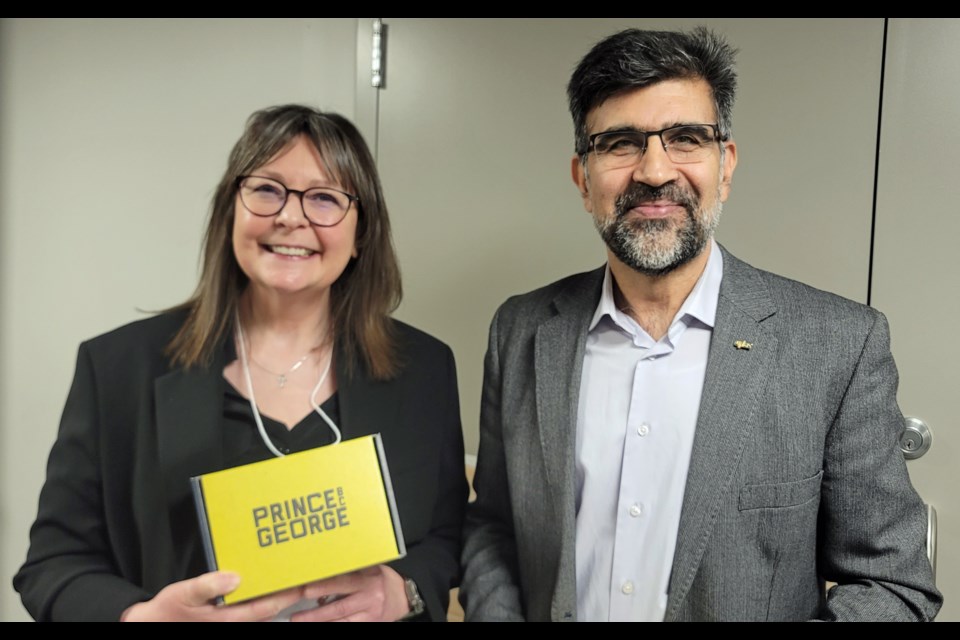Arbios Biotech announced Tuesday it has completed construction of the world’s largest hydrothermal liquefaction facility, built in the shadow of the Nechako River cutbanks.
Located on slice of land next to Canfor’s Intercontinental Pulp Mill and across the road from Tidewater Midstream’s Prince George Refinery, a project that will turn tree bark into high-value renewable bio-oil in now just months away from going into production.
Tessa Gill, the external relations lead for Arbios Biotech, made the announcement at Future Fuels Forum, where she was one of the panelists gathered for a discussion on research, development and innovation at the House of Ancestors Uda Dune Baiyoh Conference Centre.
“There’s a lot going on in Prince George that people always don’t know about, it is the hub of innovations sometimes, and we’re an example of that,” said Gill. “We’re at the stage of commercialization and that’s really exciting for us and it’s exciting for Prince George as well.”
Built mostly by local contractors, once it is up and running sometime later this year, the plant will have doubled its staff of 25 now working at the facility with at least 50 full-time employees supported by local tradespeople and material suppliers in the city.
The facility will use first-of-its-kind technology to convert hog fuel (bark and other underutilized residues from sawmills) into bio-fuel that can be refined into drop-in fuel for the transportation sector. Gill is not worried that biomass supply will ever go away, despite closures of sawmills and pulp mill operations in the region and more threatened by poor forestry market conditions.
“We’re really quite small compared to the industry around us so we do have a supply, and it’s not pure fibre, it’s residue we’re focused on, so we’re OK as a facility,” said Gill. “Once we prove this commercialization it’s a springboard for other opportunities wherever the feedstocks are.
“We do benefit from existing infrastructure here and Canfor is still here and we’ve benefited from some of the utility infrastructure as well. We have a skilled workforce here and we’ve absolutely tried to recruit locally as well.”
At an August 2022 ceremony the facility was given the name Chuntoh Ghuna, which in Lheidli T’enneh First Nation’s Dakelh dialect means The Forest Lives. Once it is up and running later this year it will have an annual capacity of 50,000 barrels of bio-oil. It has the potential for four processing lines that would raise capacity to 200,000 barrels.
Gill says while there’s not yet any formal agreement in place with Tidewater Midstream to refine the product, she’s confident a deal between neighbours can be achieved.
“It’s hard to get projects like this off the ground so we couldn’t do it without government policies and support systems and grants and structures that help us,” said Gill. “We’ve benefited from the low-carbon fuel standard and in the form of carbon credits. It’s important for Canada to protect the bio-fuels and alternative energy industry in whatever policies they consider in the future.”
Also on hand for the panel session was UNBC chemistry professor Hossein Kazemian, who says the university is closely connected to the facility and its future operations. Instructors and graduate students seeking research opportunities are already providing their expertise and will take advantage of work opportunities the state-of-the-art facility will provide.
“This kind of technology is brand new, there’s going to be lots of development,” said Kazemian. “Given the fact that R&D is becoming more expensive every day because of the equipment, because of the highly qualified personnel, they need to invest in something and I do believe collaboration and partnership between Arbios and a university like UNBC is critical for their development and also for us.”
Kazemian said UNBC’s influence in the city serving its industrial base is profound and said high school students need to recognize that while there is uncertainty right now in the forest industry there is still a need for a well-trained, highly-educated workforce to work in places like Chuntoh Ghuna.
“Universities are struggling right now,” Kazemian said. “If we don’t have those partnerships and those investments from industries we’re going to lose them and they are going to lose us as well. Losing a facility like UNBC, I cannot even think about it, but these days we are in the era where it is happening. Big universities are closing their programs, they cannot afford it.
“I do believe new industries in the region should understand and learn a lesson from bigger legacy industries. If they don’t invest in local highly-qualified personnel they’re going to struggle. Arbios understands those things given they are a technology-based company. They are opening their R&D facility right now and in the meantime are using our lab facility at UNBC. That’s something I wanted, they should consider us part of them. I’m excited for the future.”



